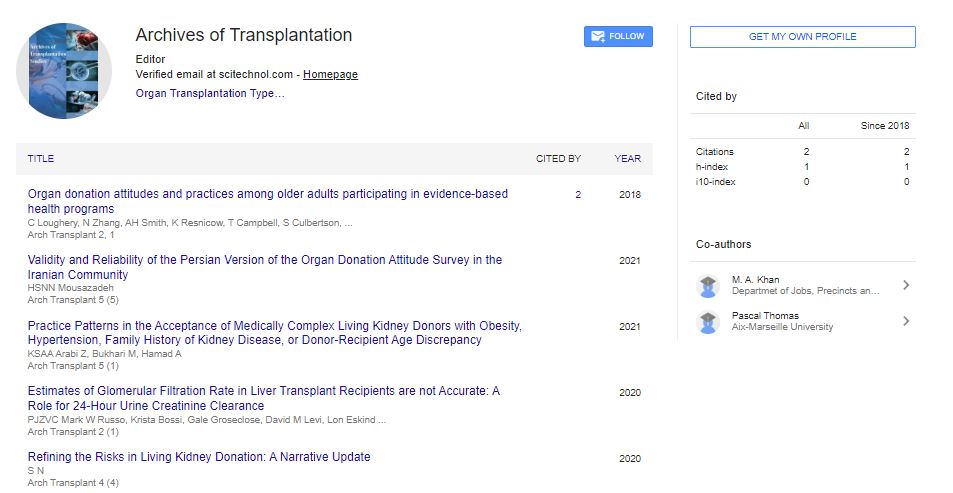Perspective, Arch Transplant Vol: 7 Issue: 2
Advancements and Challenges in Kidney Transplantation
Andrew Shaw*
1Department of Surgery, Cleveland Clinic, Ohio, USA
*Corresponding Author: Andrew Shaw,
Department of Surgery, Cleveland Clinic,
Ohio, USA
E-mail: andrew@surg.edu
Received date: 23 May, 2023, Manuscript No. AT-23-107841;
Editor assigned date: 26 May, 2023, PreQC No. AT-23-107841 (PQ);
Reviewed date: 12 June, 2023, QC No. AT-23-107841;
Revised date: 19 June, 2023, Manuscript No. AT-23-107841 (R);
Published date: 26 June, 2023 DOI: 10.4172/AT.1000135
Citation: Shaw A (2023) Advancements and Challenges in Kidney Transplantation. Arch Transplant 7:2.
Description
Kidney transplantation is a life-saving medical procedure that has revolutionized the treatment of End-Stage Renal Disease (ESRD). This procedure involves surgically replacing a failed or damaged kidney with a healthy kidney from a living or deceased donor. Over the years, advancements in medical technology and research have significantly improved the success rates and outcomes of kidney transplantation. However, despite these advancements, kidney transplantation still faces numerous challenges that need to be addressed to enhance patient outcomes and access to this life-changing procedure.
Advancements in kidney transplantation
Advancements in immunosuppressive medications have played an important role in increasing the success rates of kidney transplantation. These medications help suppress the recipient's immune system, preventing it from rejecting the transplanted kidney. The development of newer, more targeted immunosuppressive drugs has led to a reduction in rejection rates and improved long-term graft survival. The introduction of living donor kidney transplantation has been a major breakthrough in the field. Living donor transplants offer several advantages, including better organ quality, shorter waiting times, and improved outcomes compared to deceased donor transplants.
Additionally, advancements in laparoscopic surgical techniques have made kidney donation safer for living donors, leading to an increase in the number of living kidney transplants performed worldwide. Paired kidney exchange programs have emerged as a creative solution to address the shortage of compatible living donors. In these programs, incompatible donor-recipient pairs are matched with other pairs, allowing for a kidney swap, which benefits all involved. These exchanges have expanded the pool of potential donors and significantly increased access to kidney transplantation for those in need.
Advancements in organ preservation techniques have improved the viability of donor kidneys and increased the time available for transportation before transplantation. This has enabled the transportation of kidneys over longer distances and improved the chances of a successful transplant. Innovations in surgical techniques have led to the development of minimally invasive procedures for kidney transplantation. These approaches result in smaller incisions, reduced post-operative pain, faster recovery times, and improved cosmetic outcomes for recipients.
Challenges associated with kidney transplantation
One of the most significant challenges in kidney transplantation is the persistent shortage of donor organs. The demand for kidneys far exceeds the available supply, leading to lengthy waiting lists and a substantial number of patients dying while waiting for a transplant. Addressing this shortage remains a pressing concern that requires a multi-faceted approach, including increasing deceased and living donor rates and exploring alternative sources like xenotransplantation and regenerative medicine.
Despite advancements in immunosuppressive medications, rejection of the transplanted kidney remains a concern. Long-term use of immunosuppressants can lead to various complications, such as infections, cardiovascular issues and an increased risk of cancer. Balancing the need for effective immunosuppression with minimizing side effects is an ongoing challenge for transplant clinicians. Kidney transplant recipients are susceptible to various post-transplant complications, including infections, organ dysfunction, and surgical complications. Close monitoring and management of these issues are critical to ensure the success of the transplant and the well-being of the recipient.
The cost associated with kidney transplantation and lifelong immunosuppressive medications can be prohibitive for many patients. Additionally, the financial burden may extend to the donor and their family, leading to inequitable access to transplantation. Finding sustainable solutions to address the financial challenges of kidney transplantation is essential to ensure equal access to this life-saving procedure. The field of kidney transplantation raises several ethical concerns, particularly regarding living donor selection and the allocation of deceased donor organs. Ensuring fair and equitable allocation practices and protecting the rights and well-being of living donors are essential aspects that require ongoing attention and regulation.
